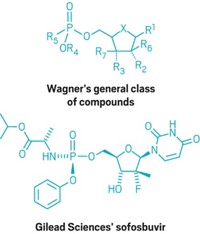Advertisement
Grab your lab coat. Let's get started
Welcome!
Welcome!
Create an account below to get 6 C&EN articles per month, receive newsletters and more - all free.
It seems this is your first time logging in online. Please enter the following information to continue.
As an ACS member you automatically get access to this site. All we need is few more details to create your reading experience.
Not you? Sign in with a different account.
Not you? Sign in with a different account.
ERROR 1
ERROR 1
ERROR 2
ERROR 2
ERROR 2
ERROR 2
ERROR 2
Password and Confirm password must match.
If you have an ACS member number, please enter it here so we can link this account to your membership. (optional)
ERROR 2
ACS values your privacy. By submitting your information, you are gaining access to C&EN and subscribing to our weekly newsletter. We use the information you provide to make your reading experience better, and we will never sell your data to third party members.
People
Pfizer Settles Celebrex Lawsuit
Intellectual Property: Drug firm logs a $450 million charge
by Rick Mullin
May 4, 2012
| A version of this story appeared in
Volume 90, Issue 19
CORRECTION: This article was updated on May 16, 2012, with the correct structure for Celebrex.
Weeks before a scheduled trial, Pfizer and Brigham Young University have settled a six-year-old lawsuit brought by the university and Daniel L. Simmons, a BYU chemistry professor, over the cyclooxygenase-2, or COX-2, inhibitor that is the active ingredient in Pfizer’s Celebrex, the blockbuster painkiller.
Although the terms were not made public, Pfizer noted a $450 million charge in connection with the settlement in its first-quarter earnings report. The university is reported to have sought 15% royalties on sales of Celebrex to date, or close to $10 billion, but a jury could have awarded much more in punitive damages and interest.
The suit contended that Simmons discovered the COX-2 enzyme and in 1991 brought the discovery to Monsanto’s Searle drug unit, which Pfizer later acquired. It claimed that BYU and Monsanto entered a research agreement to develop a COX-2 inhibitor for inflammation under the direction of Simmons.
BYU contended that the agreement ensured the university profits from patentable results but that Monsanto fraudulently terminated the deal so it could secretly develop a COX-2 inhibitor on its own. Searle went on to introduce Celebrex, the first COX-2 inhibitor, in 1999.
BYU’s complaint described other lawsuits surrounding the COX-2 enzyme in which Simmons was asked to testify as an expert witness. These included Searle’s suit against Merck & Co. over the latter’s Vioxx painkiller and a suit brought by the University of Rochester against Searle contending a patent violation. In the process, BYU’s suit contended, Simmons received information from Monsanto documents contradicting the company’s prior statements regarding research on COX-2 inhibitors. The university said the contradictions indicate that Monsanto fraudulently concealed wrongdoing.
As part of the settlement, BYU will endow a Dan Simmons Chair in recognition of Simmons’ lifelong work and contributions toward advancing human health in areas such as oncology and Alzheimer’s disease. BYU issued a statement asserting that it is pleased with the outcome. Simmons did not return a call for comment.
Pfizer issued a press release stating, “We are pleased to resolve this matter and the uncertainty of litigation and to be in a position to support Dr. Simmons’ research efforts at BYU.”





Join the conversation
Contact the reporter
Submit a Letter to the Editor for publication
Engage with us on Twitter